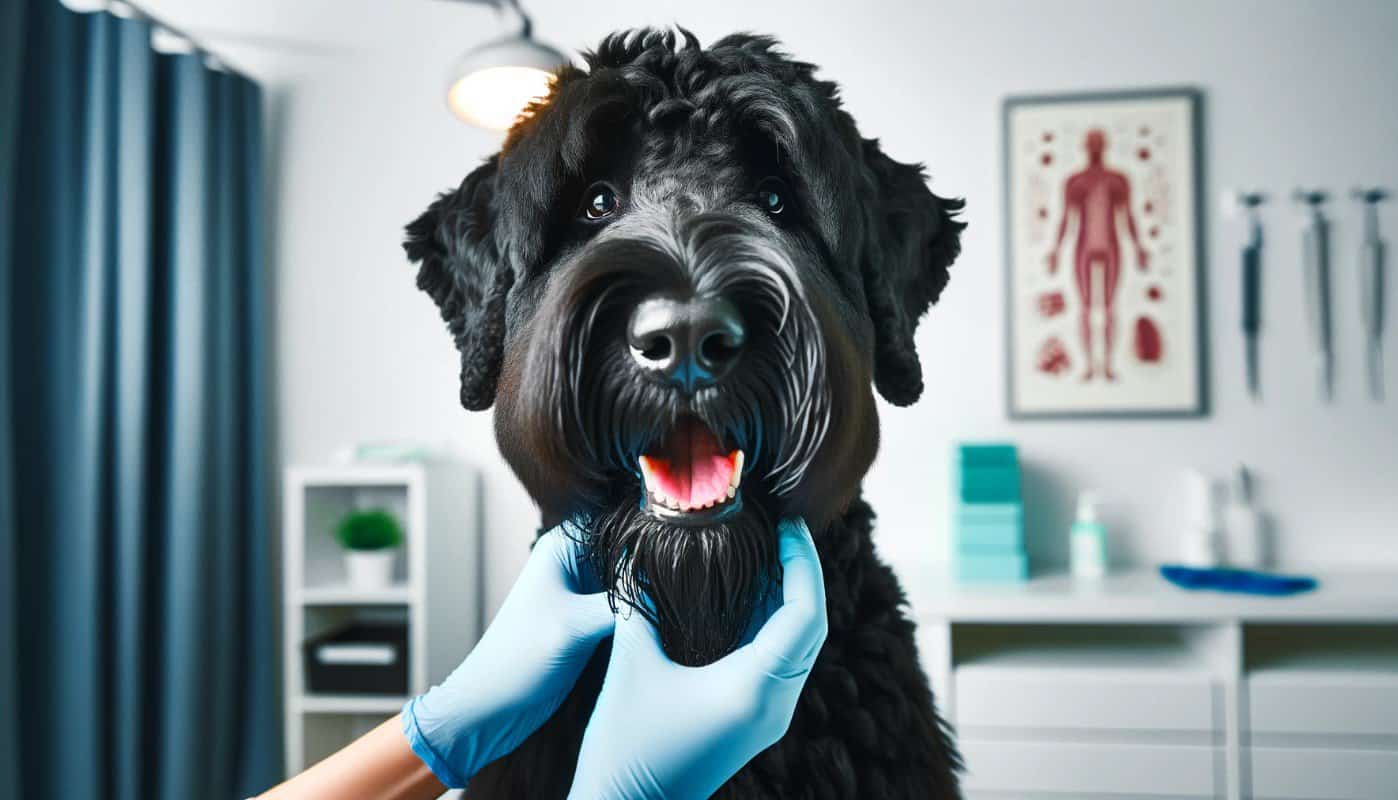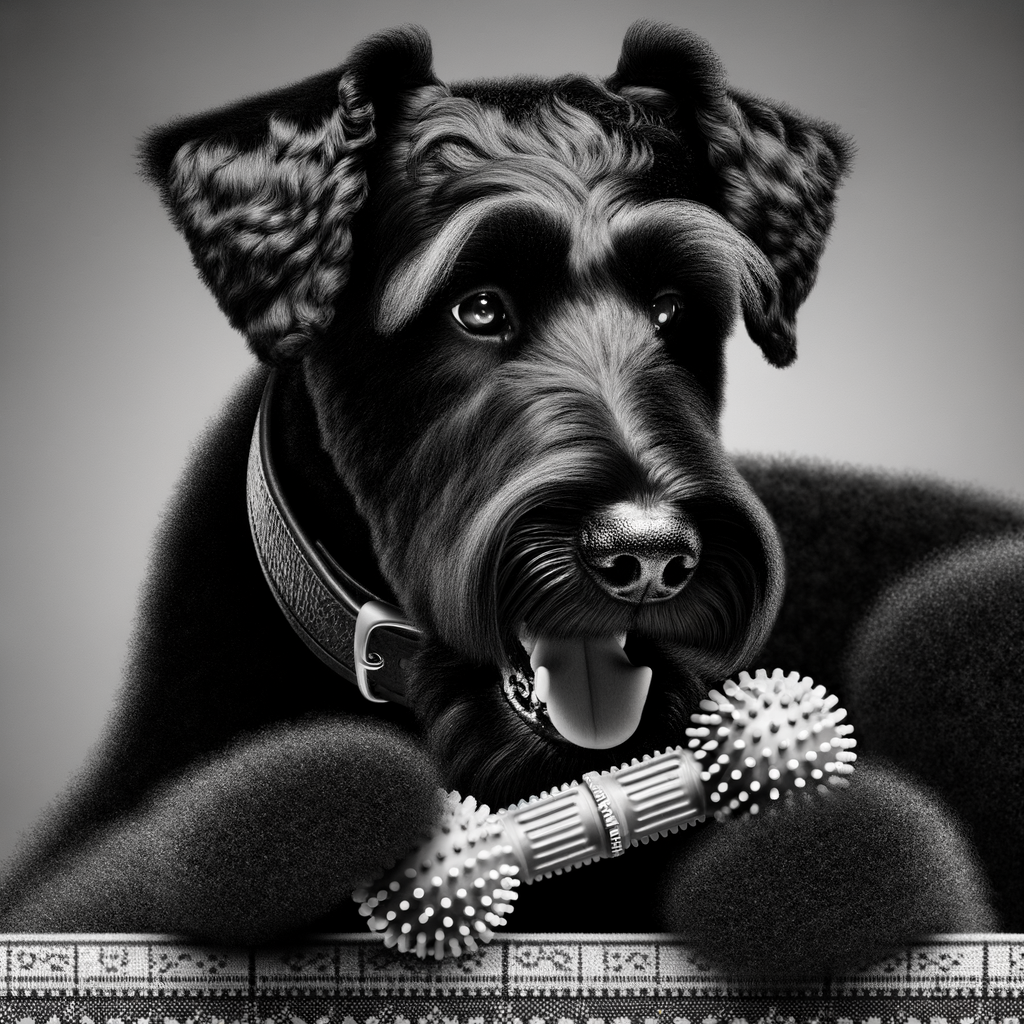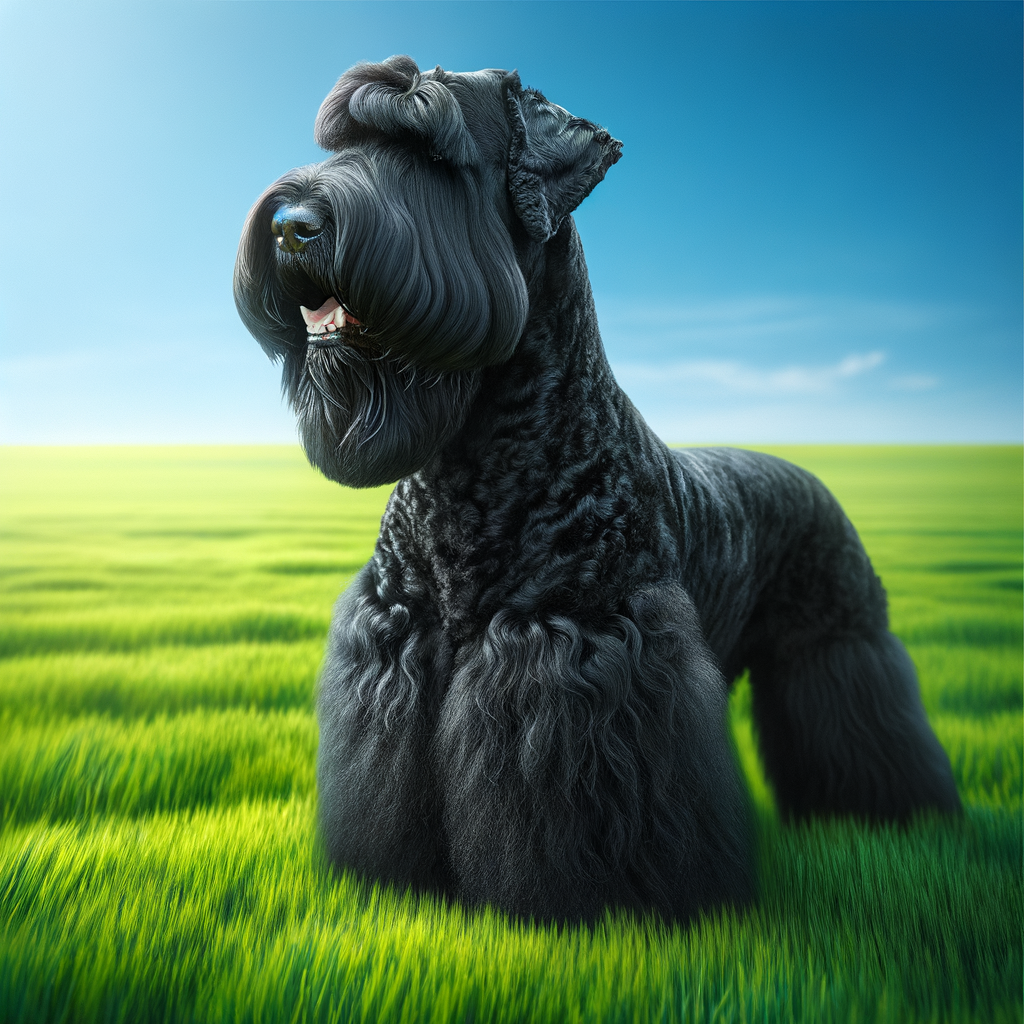Hi there, I’m Dr. Candy, your go-to holistic veterinarian. Today, we’re going to talk about a topic close to my heart – Black Russian Terrier Dental Health. If you’re a proud parent of this beautiful breed, you know how important it is to keep your fur baby healthy and happy. But did you know that dental health plays a crucial role in their overall wellbeing?

Just like in humans, poor dental health in dogs can lead to a host of problems, from bad breath to serious infections. And unfortunately, our beloved Black Russian Terriers are not immune to these issues. But don’t worry, I’m here to guide you through the signs of dental disease, common dental health issues specific to this breed, and both conventional and holistic treatments to keep those canine teeth sparkling clean.
Remember, when it comes to your dog’s health, prevention is always better than cure. So, let’s dive into the world of dog dental health and explore how we can give your Black Russian Terrier the best care possible.

Signs of Dental Disease in Black Russian Terrier
Understanding the signs of dental disease in your Black Russian Terrier is the first vital step towards ensuring their optimal dental health. Just like us, our furry friends can suffer from various dental issues, which if left unchecked, can lead to serious health problems. It’s important to remember that dental disease is not just about bad breath – it goes far beyond that!
One of the most common signs of dental disease in your Black Russian Terrier is bad breath. Although it’s normal for your dog to have slightly bad breath, a persistently foul odor could be a sign of a serious dental problem. Other signs include yellow-brown tartar on the teeth, red or swollen gums, and difficulty eating.
Moreover, if your Black Russian Terrier is drooling excessively or pawing at their mouth, it could be a sign of dental distress. Loss of appetite, weight loss, and changes in behavior such as irritability or depression can also indicate oral discomfort. In severe cases, your dog might even lose teeth.
It’s essential to regularly check your Black Russian Terrier’s mouth for any signs of dental disease. If you notice any of these symptoms, it’s crucial to seek veterinary care as soon as possible. Early detection and treatment can prevent more serious health issues and ensure your beloved pet’s overall well-being.
Remember, your Black Russian Terrier can’t tell you when they’re in pain, and they’re excellent at hiding discomfort. So, it’s up to you to be their dental health advocate. Regular checks and prompt attention to any changes can make a world of difference in their dental health and overall quality of life.
Black Russian Terrier Dental Health: What to Watch For
- Bad breath
- Yellow-brown tartar on teeth
- Red or swollen gums
- Difficulty eating
- Excessive drooling
- Pawing at the mouth
- Loss of appetite
- Changes in behavior (irritability, depression)
- Weight loss
- Tooth loss
Recognizing these signs early and seeking professional help is the best way to keep your Black Russian Terrier’s dental health in check. Your pet relies on you for their well-being, so let’s keep those tails wagging and those smiles shining!
Common Dental Health Issues In Black Russian Terrier
When it comes to Black Russian Terrier dental health, there are several common issues you should be aware of as a responsible pet parent. Being a large breed, Black Russian Terriers are more prone to certain dental problems than smaller dogs.
- Periodontal disease: This is a common issue in many dogs, including Black Russian Terriers. It occurs when plaque and tartar build up on your dog’s teeth, leading to inflammation and potential tooth loss.
- Gingivitis: This is the first stage of periodontal disease. Symptoms include red, swollen gums and bad breath. Regular teeth cleaning can help prevent this condition.
- Broken teeth: Due to their size and strength, Black Russian Terriers can easily break their teeth, especially if they have a habit of chewing on hard objects. Broken teeth can lead to pain and infection.
- Oral tumors: While not as common, oral tumors can occur in Black Russian Terriers. Regular dental check-ups can help detect these early.
It’s important to remember that Black Russian Terrier dental health is a vital part of their overall well-being. Regular dental check-ups, along with good oral hygiene at home, can help prevent these common dental issues. Always consult with your vet if you notice any changes in your dog’s oral health.

Conventional Dental Health Treatments for Black Russian Terrier
When it comes to your Black Russian Terrier’s dental health, there are conventional treatments that can help maintain a healthy mouth. These treatments are often recommended by veterinarians and are proven to be effective.
Anesthetic Dental Cleanings
One common treatment is anesthetic dental cleanings. This procedure involves your dog being put under general anesthesia, allowing the veterinarian to thoroughly clean your dog’s teeth. This process removes plaque and tartar that can lead to gum disease and tooth decay. It’s also an opportunity for your vet to examine your dog’s oral health closely and detect any potential issues early.
However, anesthesia isn’t without its risks. It’s important to have a thorough discussion with your vet about the risks and benefits before deciding on this treatment. Some dogs, especially those with heart problems, drug sensitivities, seizures, or extreme age, may face higher risks.
Potential Individual Health Obstacles
Each dog is unique and may face individual health obstacles that could impact their dental health. For instance, some Black Russian Terriers may have a predisposition to certain dental problems due to genetics or diet. Other health issues, such as diabetes, can also affect oral health.
Furthermore, Black Russian Terriers can suffer from brachycephalic syndrome, which can affect their ability to chew properly, leading to dental health issues. Always discuss these potential obstacles with your veterinarian to ensure your dog’s dental health care plan is tailored to their specific needs.
Remember, your Black Russian Terrier’s dental health is an integral part of their overall health. Regular dental check-ups, combined with a good oral hygiene routine at home, can help keep your dog’s mouth healthy. Stay vigilant for any signs of dental disease, such as bad breath, discolored teeth, or changes in eating habits, and consult your vet promptly if you notice anything unusual.
When it comes to your Black Russian Terrier’s dental health, a holistic approach can often be the most beneficial. This approach, championed by Dr. Candy, focuses primarily on diet and probiotics to maintain your dog’s oral health.
Diet- Low Carbs, Avoid Added Sugars, Enzymes In Fresh Food
The diet of your Black Russian Terrier plays a crucial role in their dental health. A diet high in carbs can lead to plaque build-up on your dog’s teeth, which can eventually lead to dental disease. Dr. Candy recommends a low-carb diet for your Black Russian Terrier to help prevent this.
Additionally, it’s essential to avoid added sugars in your dog’s diet. Like in humans, sugars can lead to tooth decay in dogs. Instead, opt for natural, fresh foods that are rich in enzymes. These enzymes can help break down plaque and tartar, promoting a healthier mouth.
- Feed your dog fresh, raw foods like carrots and apples. These foods are not only low in sugar and carbs, but they also naturally clean your dog’s teeth as they chew.
- Consider adding a digestive enzyme supplement to your dog’s diet. These supplements can help break down food particles that can lead to plaque and tartar.
Oral Health Specific Probiotics
Probiotics are another cornerstone of Dr. Candy’s holistic approach to canine dental health. These beneficial bacteria can help balance the oral microbiome, preventing the overgrowth of harmful bacteria that can lead to dental disease.
Dr. Candy recommends Probiora for Dogs, an oral health targeted probiotic. This probiotic is designed specifically to support oral health in dogs, and can help reduce plaque and tartar build-up, fight bad breath, and promote healthier gums.
- Give your Black Russian Terrier Probiora once daily to support their oral health.
- Remember, probiotics are a supplement, not a replacement for regular dental care. Continue to brush your dog’s teeth regularly and provide them with dental chews to help maintain their oral health.
Taking a holistic approach to your Black Russian Terrier’s dental health can help prevent dental disease and promote a healthier, happier dog. Remember, diet and probiotics are just part of the picture – regular dental care is also essential.

Recommended Dental Chews & Products For Black Russian Terrier
As a loving pet parent, you might be tempted to reach for commercially promoted dental chews to maintain your Black Russian Terrier’s dental health. However, it’s crucial to understand that these chews are often not as healthy or effective as they claim to be. Many are packed with sugars and artificial ingredients that can lead to obesity and other health issues. Moreover, they often provide only a temporary and superficial solution to dental problems, without addressing the root cause.
Another product to be wary of is drinking water additives. While they may promise to improve your dog’s oral health, these additives can harm the beneficial bacteria in your dog’s gut and disrupt their overall health.
So, what should you use instead? The key is to opt for natural, single-source protein products. These are not only healthier but also more effective at maintaining your Black Russian Terrier’s dental health.
Single Source Natural Proteins
Let’s look at some of the top natural dental chews and products recommended for your Black Russian Terrier:
- Tendons: These are excellent for dental health as they provide a good chew and help to scrape off plaque and tartar from your dog’s teeth. They also provide a source of high-quality protein.
- Raw marrow bones: These are a fantastic option for maintaining dental health. They help to keep teeth clean, provide essential nutrients, and offer mental stimulation for your dog. However, remember to supervise your dog while they’re chewing to prevent any potential choking hazards.
- Bully sticks: These are long-lasting, fully digestible chews that are great for dental health. They help to reduce plaque and tartar build-up while providing a tasty treat for your dog.
By incorporating these natural chews into your Black Russian Terrier’s routine, you can help to maintain their Black Russian Terrier Dental Health effectively. Remember, a holistic approach that combines a balanced diet, regular dental check-ups, and natural dental chews will provide the best outcome for your furry friend’s oral health.
Frequently Asked Questions
1. How can I prevent bad breath in my Black Russian Terrier?
Regular dental hygiene is crucial for preventing bad breath in Black Russian Terriers. Brush your dog’s teeth at least 2-3 times a week using a dog-specific toothbrush and toothpaste. Additionally, provide dental chews or toys that help remove plaque and tartar buildup.
2. What are some signs of dental problems in Black Russian Terriers?
Signs of dental problems in Black Russian Terriers may include bad breath, swollen or bleeding gums, yellow or brown teeth, difficulty eating, pawing at the mouth, and a decrease in appetite. If you notice any of these signs, it’s important to consult a veterinarian.
3. Can diet affect my Black Russian Terrier’s dental health?
Yes, diet plays a significant role in your Black Russian Terrier’s dental health. Feeding a high-quality dog food that promotes dental health, such as kibble designed to reduce tartar buildup, can help maintain good oral hygiene. Avoid feeding your dog excessive amounts of sugary or sticky treats that can contribute to dental problems.
4. Are there any specific dental care products recommended for Black Russian Terriers?
There are various dental care products available for dogs, but it’s important to choose ones specifically designed for Black Russian Terriers. Look for toothbrushes and toothpaste formulated for dogs, dental chews or treats that promote oral health, and water additives that help control plaque and freshen breath. Consult your veterinarian for specific product recommendations.
5. How often should I take my Black Russian Terrier for professional dental cleanings?
Professional dental cleanings by a veterinarian are typically recommended once a year for Black Russian Terriers. However, the frequency may vary depending on your dog’s individual dental health. Regular check-ups with your veterinarian will help determine the appropriate schedule for professional cleanings.
